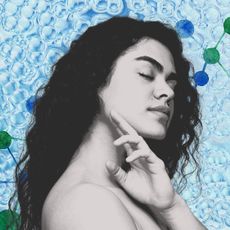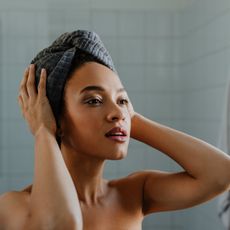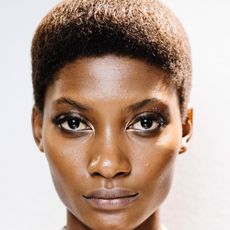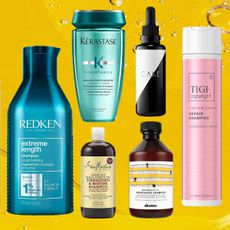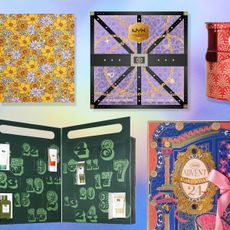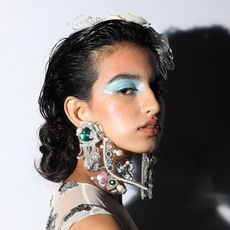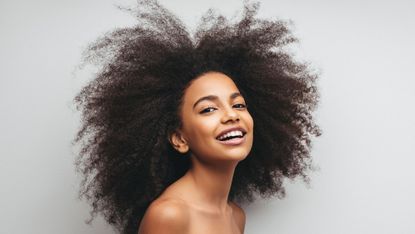

My quest for healthy hair will likely never end. There's no shampoo and conditioner duo, hair oil, or leave-in that I won't try in my quest for shine, bounce, and hydration—especially considering the specific needs of my curly hair. But while I take the best care of my hair I can, I still find myself dealing with damage (like split ends, dryness, and a dry scalp) because of factors like changing weather, pollution, and water quality. So, to mitigate damage when those issues rear their ugly heads, I keep a few trusty hair masks in my beauty cabinet at all times to save the day.
"A hair mask is an intense deep conditioner—usually much thicker in consistency— that should be used on hair that is dry or on chemically treated hair," explains Carolyn Aronson, founder and CEO of It's A 10 Haircare. "Incorporating a hair mask into your haircare routine improves the condition of the hair shaft. With an influx in moisture and hydration, the hair can become healthier and stronger."
Hairstylist and brand educator for The Mane Choice Cataanda James agrees, adding, "Hair masks provide an accelerated boost of nourishment to the strands, which is what makes these formulas more intense than traditional conditioners."
But unlike traditional conditioners, hair masks are not meant to be used every day or even every time you wash your hair. Plus, hair masks are varied in terms of the benefits they provide, how long they should be left in, and the hair types they're formulated for. All these variations can be a little overwhelming, so I asked Aronson and James to break down everything there is to know about hair masks. And, with their help, I've rounded up some of the best hair masks, whether you're struggling with damage, dehydration, or you're simply looking to inject a little extra moisture into your hair routine.
When to Use a Hair Mask
According to James, there are three main types of hair masks, which are moisture, protein, and those that combine the two.
"Protein-based hair masks strengthen your hair and help rebuild the bonds that are often broken down by over-manipulation from styling your natural texture and curls, or from chemical treatments," she explains. "Hydrating and moisture-based hair masks replenish essential nutrients to the hair for a healthier look and feel, and they defend against further damage."
Therefore, if you're considering incorporating a hair mask into your haircare regimen, take a good look at your hair and consider what aspects of its health you'd like to improve.
"Assess your hair for any split ends, dryness, or breakage," Aronson advises. "Depending on the state of your hair, it may indicate which type of hair mask you would need to resolve the issue. If your hair is dry and brittle, you may need a hair mask that provides intense hydration. If you have breakage or split ends, a protein or bond building hair mask is best."
James adds that it may be helpful to write down your concerns while assessing your hair, so that you can easily employ process of elimination and cross-reference your list with the hair mask options you see while shopping. "Hair masks will have key benefits and ingredient call outs on their packaging, most commonly found on the front of the label. If you do not see your concern called out, that particular product may not yield the best results."
And if you're having trouble identifying the type of TLC your hair needs, James suggests taking an online self-assessment "to determine your individual hair type, texture, and to pinpoint specific hair concerns that you would like to address." In particular, she recommends The Mane Choice's Hair Quiz, which recommends products based on the user's preferences, hair type, needs, and lifestyle.
Still, some people are guaranteed to benefit from hair masks, no matter their preferences or lifestyles.
"Textured and chemically treated hair typically are a good fit for hair mask treatments, as the strands can be prone to dryness or breakage," says Aronson. "Textured hair thrives when moisturized and hydrated with quality ingredients and water. The same goes for chemically treated hair: It needs ingredients that will restore the hair shaft after being broken down by chemicals."
James agrees, adding that curly hair tends to be drier than straight hair. Plus, she says, "Hair masks also help ease detangling to promote strands' elasticity for length retention and curl formation."
On the other hand, if your hair is on the thin side and it's not curly or textured, both Aronson and James note that masks may not be best.
"Generally, hair masks are heavy due to the use of creams and oils, and can weigh finer hair textures down," says Aronson. In those cases, James suggests using a light hair lotion or cream for hydration instead.
How to Use a Hair Mask
We're all pretty well-versed on how to wash our hair, and even how to style it with leave-ins, gels, and creams, but hair masks require a different routine that lies somewhere in between that of your everyday conditioner and your favorite leave-in.
Instructions may vary from product to product, so be sure to check the container on your favorite hair mask before applying. Generally speaking, however, a mask is meant to be applied to damp, clean hair. You can comb the product through to ensure even application.
"If you have straight, fine, thin hair, consider only applying the mask from the mid-lengths to ends of your hair," says James. "This will still allow you to reap the benefits of the hair mask without weighing your hair down or causing any excessive oiliness at the root."
On the other hand, for those with thick, dry, textured, curly, or damaged hair, she advises, "Start with the minimum recommended and increase as needed. You will know when you have ample amount for your hair density and texture because there will be even distribution of product and your fingers will glide through from root to ends while releasing the tangles."
Then, leave the hair mask on for the time recommended on the bottle (some masks are meant to be left on for 30 minutes, while other, more high-potency options are to be left on for only ten minutes).
"Some hair masks require longer times than others or heat to maximize its benefits," explains Aronson. "If a more intense conditioning treatment is required, use heat by covering the hair with a plastic cap or sitting under a hair dryer for deeper penetration."
Personally, I like to leave my hair masks on for the maximum amount of time suggested, and I contain my drenched strands in a shower cap while the conditioner sits. This both maximizes the formula's hydrating effects and keeps my skin from getting covered in the mask.
Best Hair Masks for Damaged Hair
- Best Hair Mask for Color-Damaged Hair: Kérastase Resistance Mask for Severely Damaged Hair
- Best Hair Mask for Heat-Damaged Hair: Briogeo Don't Despair, Repair! Deep Conditioning Mask
- Best Hair Mask for Breakage: The Mane Choice Ancient Egyptian Anti-Breakage Hair Mask
- Best Hair Mask for Natural Hair: SheaMoisture Raw Shea Butter Deep Treatment Masque
- Best Hair Mask for Straight Hair: ALTERNA Haircare My Hair My Canvas Cool Hydrations Nourishing Masque
- Best Hair Mask Overall: Act + Acre Restorative Hair Mask

Aronson highly recommends this product, writing, "It is keratin-infused for that extra boost of protein which helps rebuild hair strength."
Pros: protein-infused; expert-approved; cruelty-free; infused with natural ingredients like aloe vera; detangling
Cons: expensive

I'm obsessed with Act + Acre's hair products. This hair mask, along with the rest of the line, is infused with natural ingredients like castor oil and shea butter, both of which help with my curl definition and support healthy hair growth.
Pros: editor-approved; gentle scent; contains natural ingredients; vegan; free of sulfates, silicones, parabens, and phthalates; color-safe
Cons: expensive

Unlike most hair masks, which are made for thick, curly, hair, this buttery hair mask works well on straight hair by providing substantial moisture without weighing strands down. Plus, it only needs to be left in for 2-3 minutes, so it's easy to incorporate into any haircare routine.
Pros: vegan; works well on straight and thin hair
Cons: contains sulfates

"This deeply moisturizing formula makes detangling easier, improves manageability and infuses the hair and scalp with intense hydration to help reduce breakage," James attests. "It contains sea soothing complex and sarcosine, and is infused with biotin, Vitamins A, B, and C, and sea minerals, all of which help maintain hair's moisture balance and improve manageability. I recommend this for all hair types."
Pros: expert-approved; reduces breakage; detangling
Cons: contains sulfates

I love this unique mask from Nuele. It's made from natural ingredients, and comes with two components: a serum and a powder. The two, when mixed, create a rich mask that helps hydrate hair, detangle, and diminish frizz. I also notice quick results when I use this mask.
Pros: clean; quick results; charitable brand
Cons: expensive; needs to be mixed before it's used

"The Ancient Egyptian Anti-Breakage Hair Mask leaves hair looking and feeling stronger overall," says James. "It nourishes, protects, minimizes breakage, and helps hair bounce back from damage. Hair that is prone to breakage and split ends, weak or damaged will benefit greatly from this formula infused with Kalahari Oil, Oleaster Oil, Mongongo Oil, and Baobab Oil to strengthen, add shine, and help to repair hair strands. This restorative blend also includes Omegas 3, 6, and 9."
Pros: reduces frizz and breakage; expert-approved; affordable
Cons: none found

Aronson loves this best-selling mask from It's a 10, which is infused with collagen, sweet almond oil, keratin, and apricot kernel oil. She says, "It’s for most hair types and delivers instant results."
Pros: fast results; expert-approved; easy to use; detangling; cruelty-free; restores hair elasticity
Cons: contains silicones

This treatment from SheaMoisture is my go-to. It has a gentle scent, just the right amount of thickness, and my hair immediately feels softer after each use. It also doesn't weigh down my curls—a huge plus in my book.
Pros: affordable; immediate results; editor-approved; cruelty-free
Cons: strong scent

"The Alpha Green Tea & Carrot Deep Strengthening & Restorative Treatment Mask is the special treat your hair has been craving and needing!" James raves. "This formula is packed green tea, and carrot oil to penetrate and infuse hair with vitamins and nutrients, to help repair and restore dry, damaged hair, improves elasticity and manageability. The healthy dose of biotin strengthens and encourages length retention."
Pros: expert-approved; cruelty-free; contains natural ingredients; protein-infused
Cons: contains sulfates

This mask is a bestseller, and with good reason. It's intensely hydrating and works to repair hair that's been damaged by chemicals, heat or general over-processing. With continual weekly use, users say that it increases softness, defines curls, and reduces the appearance fo damage from bleaching or coloring.
Pros: cruelty-free; vegan; free of sulfates, phthalates, parabens, silicones, and petrochemicals
Cons: none found

"I recommend this specially formulated mask for all hair types made up of a healthy blend of ingredients and infused with Vitamins A, C, and E to aid in hair rejuvenation," says James. "This treatment will provide a luxurious experience in your shower because it releases heat on contact with water allowing the hydrating ingredients to deeply moisturize your hair! For a more intense treatment, you can cap it and go under a dryer for 15 minutes or leave in up to an hour without heat."
Pros: intensely hydrating; easy to incorporate into shower routing; expert-approved
Cons: contains sulfates

This mask is perfect for thick hair that needs a little extra TLC. It takes just five minutes of your time, once a week, and voilá! Hydrated hair with minimal frizz. Reviewers also note that while it packs an impressive punch of hydration, it never weighs hair down.
Pros: free of parabens, sulfates, and phthalates; gentle scent
Cons: contains silicones

This cult-favorite mask has a following for a reason. It's specifically created to help minimize and heal damage from heat tools and dye. Reviewers say that it made a noticeable, visible difference in the health and appearance of their hair, but note that it's important to follow the directions on the bottle to a T.
Pros: clean; works on all hair types and textures; easy to use
Cons: contains sulfates

Per this product's name, it's formulated specifically for hair that's been damaged from chemical treatments, heat, and/or dye. One reviewer, who writes that her hair had previously been coming apart in her hand, writes that this mask saved her tresses after only two uses.
Pros: easy to use; fast results; reverses damage; softening
Cons: expensive

Reviewers with all hair types love this mask for its hydrating and shine-enhancing capabilities. Plus, this minty formula also supports scalp health, and customers with dry, flaky scalps attest to its ability to soothe and moisturize this tricky area.
Pros: clean; vegan; made with curly and coily hair in mind; works on all hair types; silicone-free; supports scalp health
Cons: expensive

This ginger-scented mask from Fable & Mane supports both follicular and scalp health, formulated for hair that's been impacted or damaged by environmental stressors. Users write that their hair feels stronger after just a few uses, and that the mask is easy to incorporate into their existing routines.
Pros: vegan; shine-enhancing; silicone-free; clean; works on all hair types; easy to use
Cons: strong smell

This mask is infused with honey, which not only gives it a great scent, but also helps it hydrate your hair better. Reviewers call the formula curl-defining, moisturizing, and softening.
Pros: clean; hydrating; frizz-reducing
Cons: may be too thick for those with oily scalps

Infused with jojoba oil and vitamin C, this mask promises to hydrate dry hair and reduce frizz in only five minutes. Indeed, reviewers rave that after a single use, their hair felt softer and looked shinier.
Pros: cruelty-free; vitamin-infused; works on all hair types
Cons: strong smell

This mask support strong hair and reverses damage by hydrating the hair from root to tip. Plus, it moisturizes your scalp, too, consequently creating an optimal environment for hair growth and retention.
Pros: vegan; cruelty-free; paraben-free
Cons: strong smell

I wouldn't blame you if you want to use this mask solely for the scent. Lavender and mint both calm and stimulate the scalp and hair. I personally feel like I'm at the spa when this mask is doing it's thing in my hair. It comes in convenient packets so you can easily travel with them or throw them in your bags and don't have to deal with unwieldy bottles or tubs.
Pros: gentle, soothing scent; convenient for travel
Cons: single-use
How Often to Use a Hair Mask on Damaged Hair
As for how often should you use a hair mask? Both Aronson and James say that frequency completely depends on the needs and condition of your hair.
"If your hair is more dry or brittle, then a weekly hair mask is recommended in order to maintain hydration," says Aronson. "If the hair is in a healthier state with no chemical manipulation, then a monthly hair mask is more appropriate. Also, in the winter you may find you need to use a hair mask more frequently due to dryer weather."
James seconds this. "Based on your hair type, you should consider deep conditioning your hair after each wash day for drier, more damaged strands and/or hair that has been over manipulated," she says, "Or, once or twice a month for maintenance works fine if your hair isn’t lacking nourishment or showing any deficiencies."
Meet the Experts

Cataanda James is a natural hairstylist and brand educator for The Mane Choice. Currently, she's based in New York City.

Carolyn Aronson has over 20 years of experience working as a hairstylist and salon owner in multiple states across the US. Her brand, It's A 10 Haircare, champions self-love through haircare and is also involved in a number of philanthropic efforts both at home and abroad.

Gabrielle Ulubay is an E-Commerce Writer at Marie Claire and writes about all things beauty, sexual wellness, and fashion. She's also written about sex, gender, and politics for publications like The New York Times, Bustle, and HuffPost Personal since 2018. She has worked extensively in the e-commerce and sales spaces since 2020, including two years at Drizly, where she developed an expertise in finding the best, highest quality goods and experiences money can buy. As a film school graduate, she loves all things media and can be found making art when she's not busy writing.
-
 An Astrologer Told Me Where I'll Find Success—Here's How to Find Your Own Power Places Using Astrocartography
An Astrologer Told Me Where I'll Find Success—Here's How to Find Your Own Power Places Using AstrocartographyAstrocartography, or the astrology of locations, can reveal where you'll find love, career success, and even your ideal vacation spot.
By Brooke Knappenberger
-
 Forget Botox—Exosome Therapy Is the Hottest New Anti-Aging Trend
Forget Botox—Exosome Therapy Is the Hottest New Anti-Aging Trend“Think of exosomes as the body’s own information superhighway.”
By Samantha Holender
-
 Margot Robbie Isn’t Just Playing Barbie—She *Is* Barbie
Margot Robbie Isn’t Just Playing Barbie—She *Is* BarbieThe proof is in her press tour looks.
By Rachel Burchfield
-
 How Often You Should Wash Your Hair, According To Experts
How Often You Should Wash Your Hair, According To ExpertsKeep it fresh, my friends.
By Gabrielle Ulubay
-
 The 11 Best Magnetic Lashes of 2023
The 11 Best Magnetic Lashes of 2023Go ahead and kiss your messy lash glue goodbye.
By Hana Hong
-
 The 30 Best Hair Growth Shampoos of 2023, According to Experts
The 30 Best Hair Growth Shampoos of 2023, According to ExpertsRapunzel hair, coming right up.
By Gabrielle Ulubay
-
 The 23 Best Beauty Advent Calendars of 2023
The 23 Best Beauty Advent Calendars of 2023The gift that keeps on giving—literally.
By Julia Marzovilla
-
 The 18 Best Natural Hair Products in 2023
The 18 Best Natural Hair Products in 2023Remember: Your curls are your crown.
By Gabrielle Ulubay
-
 The 9 Best Hot Rollers for the Curls of Your Dreams
The 9 Best Hot Rollers for the Curls of Your DreamsThis is how we roll.
By Samantha Holender
-
 The 12 Best Cream Eyeshadows, According to Makeup Artists
The 12 Best Cream Eyeshadows, According to Makeup ArtistsThe best part? They’re so easy to apply.
By Samantha Holender
-
 The 17 Best Sea Salt Sprays for Vacation Hair
The 17 Best Sea Salt Sprays for Vacation HairGet the beachy waves of your dreams with these fake-it-'til-you-make-it sea salt sprays.
By Gabrielle Ulubay

